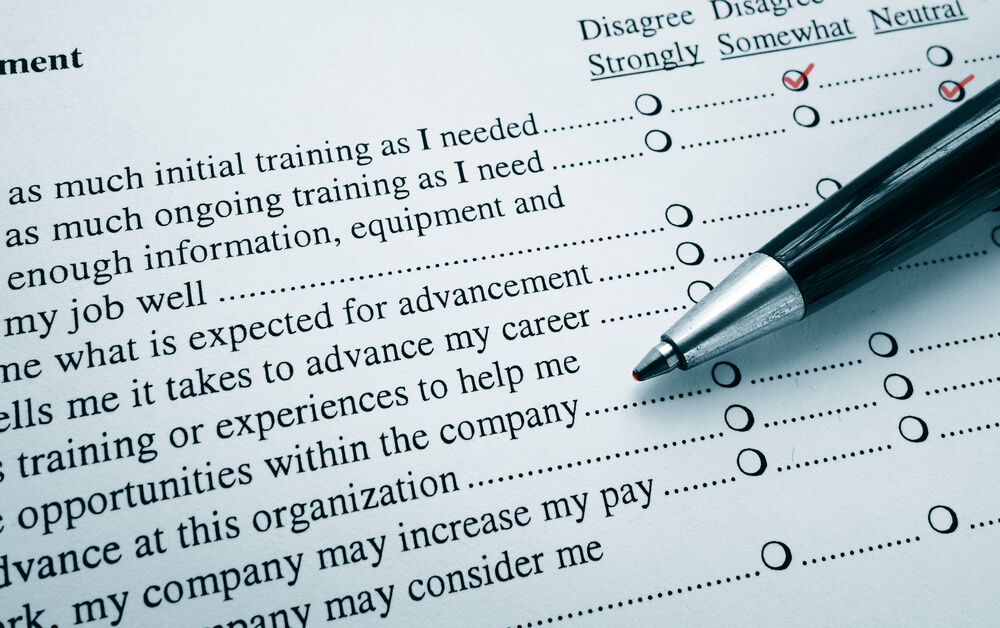Employees are perhaps the most important asset for organizations. Companies literally could not stay in business without them. Yet far too many employees feel unappreciated, underpaid, overworked and overruled.
Enter the employee satisfaction survey. Savvy business leaders know that keeping employees satisfied and engaged offers the following benefits to their organization as a whole:
- Retention of valuable employees
- Motivation among employees to work harder
- Higher levels of employee engagement
- Improved productivity among employees
The fact is, engaged employees are better employees. Organizations with high employee engagement outperform those with low employee engagement by 202%.1
On the flipside, disengaged employees cost organizations between $450 and $550 billion annually.2
But creating a truly effective employee satisfaction survey – one that will glean information that can be applied to keep employees happy – is not as simple as slapping together a halfheartedly compiled list of questions.
First, tone is critical. Using corporate jargon sounds stuffy and even condescending. Remember, you want to make it clear that you value, and take seriously, your employees’ feelings and beliefs about their day-to-day and long-term experience.
Once you have nailed the tone, it is critical to ask the right questions. Do not be afraid to delve deep. The entire purpose of the survey, after all, is to inform future decisions in order to foster employee satisfaction. Asking the following 30 questions will tell you everything you need to know.
Questions about Leadership
- Does management seem invested in the team’s success?
Employees will pick up on it if leadership comes across as apathetic about achieving team and individual goals, and it will influence their level of enthusiasm.
- Does it seem like management is all on the same page?
Employees follow management’s lead, whether consciously or subconsciously. Unified management lays the foundation for a unified team.
- Does leadership set clear goals?
Setting unified, clear goals provides employees with a road map to follow and ensures that everyone is on the same page.
- Have you received recognition from your supervisor in the past month for your contributions and accomplishments?
Employees that feel like their hard work is appreciated and recognized are motivated to continue performing at a high level.
- On a scale from 1 to 10, how dependable is your direct supervisor at recognizing your contributions and accomplishments?
This next question piggybacks on question number three to quantify the employee’s feedback with an easily measurable number.
- Do you feel comfortable giving feedback and suggestions to your supervisor?
You will never get to hear your employees’ great ideas, prevent or anticipate problems, help brainstorm solutions if they feel too intimidated by their manager to voice them and they will not feel like their input matters.
- Does your supervisor voice appreciation and consideration of your feedback?
Making employees feel comfortable about voicing their opinions is just half of the battle. It is equally, if not more, important for supervisors to make it clear they value their feedback.
- Are your job responsibilities clearly defined?
Employees must know exactly what the responsibilities of their roles are in order to perform well in them.
- How supportive is your supervisor of your professional developmental goals?
Good employees who feel their development growth is encouraged and nurtured by their manager are more likely to perform well and remain at the company.
- Do you feel that your direct supervisor respects you?
Respect is the ultimate gesture you can give employees. It breeds loyalty, motivation, drive and a burning desire to exceed expectations.
Questions about Co-Workers
- Do you feel there is a healthy level of appreciation and respect between co-workers?
While employees answer to managers, they work with their colleagues on a daily basis, so mutual respect is essential to have in the workplace. However, more importantly appreciation is of even greater relevance. Are employees working together to provide encouragement or brainstorm solutions when a team or individual is struggling? Do they offer praise and acknowledgement for a job well-done? Do they challenge each other to keep performing better, learning more and work with each other to refine learning curves, processes, efficiencies, etc.?
- Do you feel a connection between your co-workers and yourself?
Co-workers do not have to be the best of friends to feel a certain level of camaraderie. After all, they spend 40-plus hours per week with these people – in some cases, more time than they get to spend with their family and friends.
- Are conflicts between co-workers resolved in a way that is satisfactory to all parties?
While it is impossible to please everyone all of the time, management can still facilitate conflict resolution that, at the very least, takes all parties’ points-of-view into account.
- Do all co-workers get an equal opportunity to contribute to their team?
Human nature can make it tricky to democratize contributions, as some people are just naturally dominant and others more passive. However, there are steps leadership can take to make sure everyone’s voice is heard.
- Do you feel the workload is evenly distributed across your team?
Overworked employees can quickly become a serious liability to an organization. The become mentally exhausted, their performance suffers and they grow resentful. Look to see if there are specific reasons why the workload may be more intense for some and less for others. Are some handing off responsibilities? Are some not doing a thorough job? Is there room for cross-training? Are some not delegating or micromanaging too much?
Questions about the Job Itself
- Do you feel that your abilities and skills are utilized as much as they could be in your role?
Feeling like their strongest skills are being overlooked by management can result in frustration and resentment in employees, as well as robbing the company of valuable contributions they could make.
- How challenged do you feel by your job on a daily basis?
Boredom can drive away employees as surely as feeling overworked. A healthy sense of being challenged is beneficial.
- What are your favorite aspects of your job and why?
Learn firsthand how you can give employees more of what they love. However, in doing more of what they love to do, be sure to keep them challenged. Loving what you do easily turn into boredom if it becomes routine so be sure to ask this question in conjunction with questions about future goals, dreams, etc. as it relates to promotion, education, etc.
- What are your least favorite aspects of your job and why?
This is the same idea as question number 18, except that it reveals what employees want less of in order to feel satisfied.
- What would you like to do more of in your role?
The answer to this question can encompass a variety of aspects, from types of work to frequency of travel.
- Do you feel that your work is meaningful?
Meaningful work fosters employee engagement. Employees that feel their work makes a different in some way are more likely to work hard. Delve into this question further by getting into other ways that work can be made more meaningful and fulfilling such as through volunteer or charitable giving, quality time with family/friends, etc.
- What would you rate as your biggest professional accomplishment to date?
The answers to this question will give you insight into how employees view their own accomplishments and which accomplishments give them the greatest sense of pride.
Questions about the Company
- Do you like the company culture?
Company culture may sound like a minor afterthought, but in fact, it is tremendously important to employees – sometimes overruling factors such as salary and benefits.
- Do you feel our organization is open to change?
A stagnant culture, procedures, practices or set goals can be detrimental to future growth and success. The solution is to remain open minded to change and the many benefits it offers.
- Does the company provide you with the tools and technology you need to do your job well?
Legacy and outdated tools can adversely affect morale at an organization, as constant struggles with malfunctioning technology can leave employees exhausted and frustrated.
- What is our company’s biggest strength that we should focus on more?
You might be overlooking an obvious trait that your employees recognize because they are in the trenches. Plus, people love being asked for their expertise.
- Please name a process at our company that needs improvement and explain why.
Learn what is not working for employees and, at the same time, let them know that their opinions and input matter.
- What are we doing that is working and we should continue doing?
The answers to this question will help leadership capitalize on the strengths and successes the organization already has in its favor.
- Did your onboarding experience adequately prepare you for your role at our company?
Onboarding is critical for preparing new hires for success, plus it is the first experience new hires have your organization, so establishing and executing a solid onboarding process is very important.
- Would you refer someone to work here?
The answer to this question speaks volumes about all aspects of your employees’ experience including company culture, management, co-workers and processes.
It may take a bit of extra time, but compiling a list of thoughtful questions that delve deep ensures your employee satisfaction survey will provide valuable insight. You can use the feedback you receive to improve the overall experience for employees at your company, fostering employee loyalty, retention and productivity.
For more information about how Gavel International can help your organization through outsourced meeting planning, event and travel incentive programs, contact us.
SOURCES:
This article was last updated on November 23, 2022
- 12 Words that Hurt Marketing Copy and Efforts - January 13, 2025
- Gavel International Marks 40 Years with Acts of Kindness - December 19, 2024
- Gavel International Delivers Joy Through Toys for Tots - December 17, 2024






